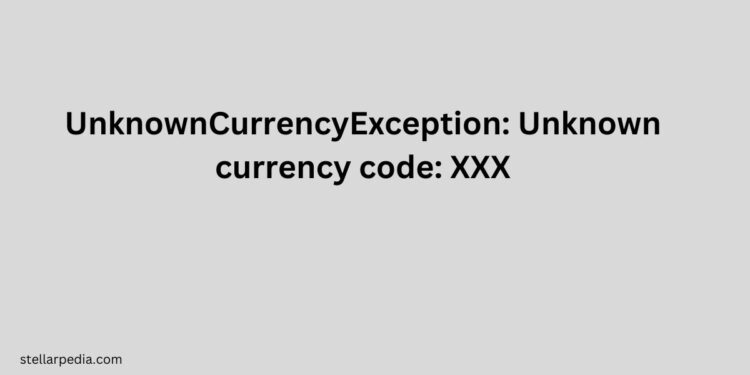Introduction
In today’s globalized world, financial transactions often span multiple countries and currencies. Accurate currency management is crucial for the seamless execution of international business operations. However, developers and users occasionally encounter exceptions related to currency codes when working with financial software or applications. One such exception is the UnknownCurrencyException: Unknown currency code: XXX. This article delves into the nature, causes, and solutions for this exception, providing a comprehensive understanding of the issue.
What is UnknownCurrencyException?
UnknownCurrencyException is an error that occurs when a currency code provided to a software application or financial system is not recognized. Currency codes are standardized by the International Organization for Standardization (ISO) under the ISO 4217 standard. These codes typically consist of three letters, such as USD for US Dollar, EUR for Euro, and JPY for Japanese Yen. When a currency code that does not conform to these standards is encountered, the system throws an UnknownCurrencyException.
Causes of UnknownCurrencyException
1. Typographical Errors
One of the most common reasons for encountering this exception is typographical errors. Mistyping a currency code, such as entering “USDD” instead of “USD,” will result in an unknown currency exception. This can happen due to manual data entry or errors in automated processes.
2. Unsupported or Non-Standard Currency Codes
Some applications may not support all currency codes, especially those that are less common or newly introduced. For example, a system might not recognize a recently added currency code if it hasn’t been updated to the latest ISO 4217 standard.
3. Incorrect Configuration or Data Source
If the configuration files or databases that the application relies on for currency information are outdated or incorrectly set up, this can lead to unknown currency exceptions. The application might be referencing an old list of currency codes or a corrupted data source.
4. Programmatic Errors
Errors in the code logic, such as incorrect handling of currency information or bugs in the currency processing modules, can also trigger this exception. For instance, if a currency code is generated dynamically and the logic fails to produce a valid code, the system will not recognize it.
How to Handle UnknownCurrencyException
1. Validate Currency Codes
To prevent typographical errors, it’s essential to validate currency codes before they are processed. Implementing input validation mechanisms can help catch and correct invalid codes. For example, you can use regular expressions to ensure the currency code adheres to the ISO 4217 format.
javaCopy codeif (!currencyCode.matches("^[A-Z]{3}$")) {
throw new IllegalArgumentException("Invalid currency code format");
}
2. Update Currency Data Regularly
Ensure that your application’s currency data is up-to-date. Regularly update your system with the latest ISO 4217 currency codes to accommodate new or updated currencies. Automated scripts can be used to fetch and update this data periodically.
3. Handle Exceptions Gracefully
Implementing proper exception handling mechanisms can improve the user experience and system robustness. Catching and logging the UnknownCurrencyException allows developers to diagnose and address the issue without crashing the application.
javaCopy codetry {
Currency currency = Currency.getInstance(currencyCode);
} catch (UnknownCurrencyException e) {
// Log the exception and provide a user-friendly message
logger.error("Unknown currency code: " + currencyCode, e);
throw new CustomException("The provided currency code is not recognized. Please check and try again.");
}
4. Maintain Configuration and Data Integrity
Regularly review and maintain configuration files and databases to ensure they are accurate and up-to-date. Implement checks and audits to verify the integrity of your currency data sources.
5. Robust Programmatic Logic
Ensure that your code logic for handling currency information is robust and well-tested. Implement unit tests and integration tests to cover scenarios involving currency code processing.
Example Scenario
Let’s consider an example scenario where an online e-commerce platform encounters the UnknownCurrencyException.
Scenario Description
An e-commerce platform supports multiple currencies for transactions. A customer tries to purchase an item using a currency code “XXX” which is not recognized by the system, resulting in an UnknownCurrencyException.
Analysis and Solution
- Input Validation: Implement input validation on the currency code field to ensure it conforms to the ISO 4217 standard.
- Data Update: Check if the currency code “XXX” is a newly introduced code and update the system with the latest ISO 4217 data.
- Exception Handling: Modify the code to catch the
UnknownCurrencyExceptionand provide a user-friendly error message, suggesting the customer double-check the currency code.
javaCopy codetry {
Currency currency = Currency.getInstance("XXX");
} catch (UnknownCurrencyException e) {
// Log the exception
logger.error("Unknown currency code: XXX", e);
// Provide user feedback
System.out.println("The currency code provided is not recognized. Please verify and try again.");
}
Conclusion
The UnknownCurrencyException: Unknown currency code: XXX is a common issue that arises due to various reasons including typographical errors, unsupported currency codes, outdated data, and programmatic errors. By understanding the causes and implementing robust validation, regular updates, proper exception handling, and maintaining data integrity, developers can effectively prevent and handle this exception, ensuring a smooth and reliable financial operation in their applications.


![TypeError [ERR_UNKNOWN_FILE_EXTENSION]: Unknown File Extension “.javascript” in Node.js](https://www.stellarpedia.com/wp-content/uploads/2024/06/UnknownCurrencyExceptionUnknowncurrencycodeXXX-ezgif.com-jpg-to-webp-converter-75x75.webp)
